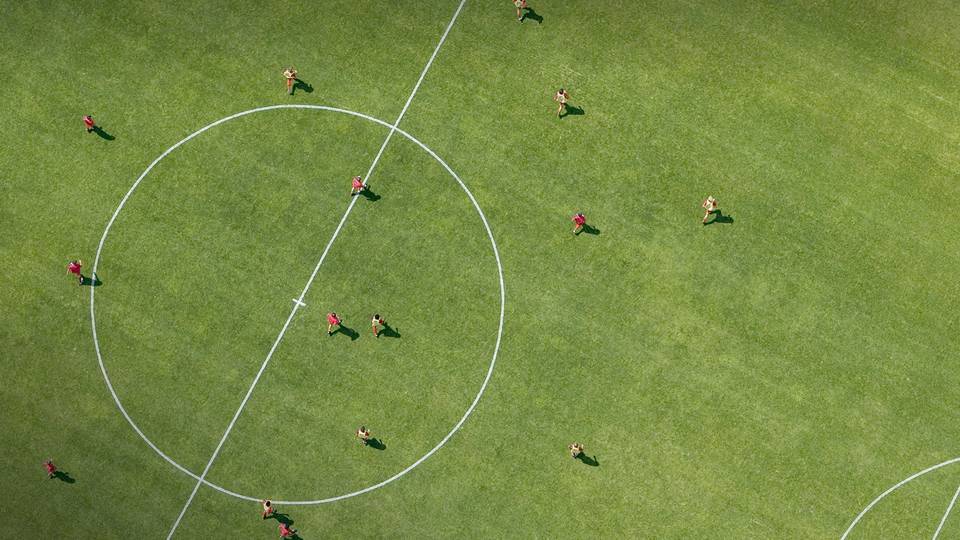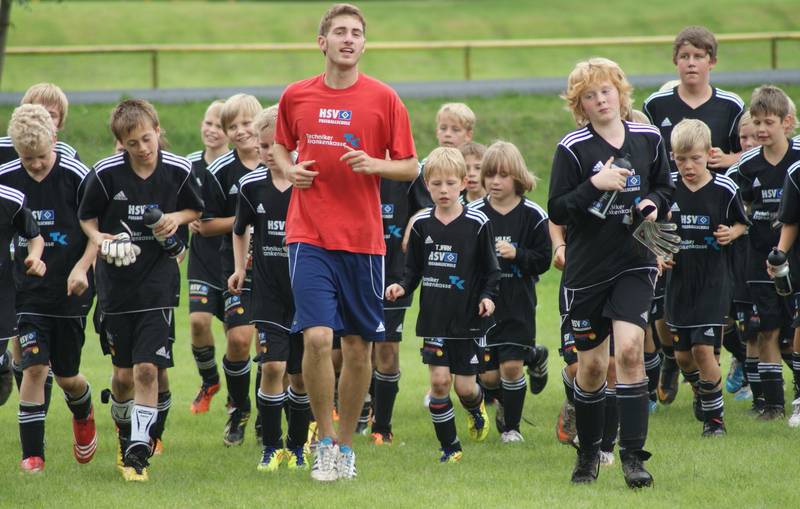Youth football at the U11 level follows specific rules designed to promote skill development and fair play. In the UK, these rules include playing with a Size 4 ball and modified pitch dimensions that create an appropriate learning environment for children aged 11-12. U11 football features 9v9 matches where defensive players must maintain at least eight yards distance from the ball during free kicks.
The transition from mini-soccer to the 9v9 format helps young players gradually adapt to the larger 11v11 game they'll encounter as they progress. Teams at this age group participate in a maximum of three trophy events during the season, as league stats are not emphasized to encourage development over competition. Special provisions exist for teams with fewer players, including rules that allow players to propel the ball over three lines without penalization when a significant numerical disadvantage exists.
These modified rules ensure that children enjoy their introduction to the more structured aspects of football while maintaining the fun, inclusive atmosphere essential for youth development. Coaches and referees at this level focus on teaching fundamental skills and fair play principles rather than competitive outcomes, creating a positive soccer experience that builds a foundation for future participation.
Basics of U11 Football
U11 football represents a crucial transitional stage where young players develop more complex tactical understanding while building on foundational skills. The format typically shifts from smaller-sided games to a structure that more closely resembles the full 11-a-side game.
Team Composition and Pitch Setup
In U11 football, teams typically play either 7v7 or 9v9 formats depending on the competition guidelines. For 7v7, each team fields six outfield players plus a goalkeeper. The 9v9 format includes eight outfield players and a goalkeeper.
The pitch dimensions are proportionally smaller than full-size pitches, typically measuring approximately 60 by 40 metres for 7v7 or 70 by 50 metres for 9v9. Goals are smaller as well, usually 3.6m wide by 1.8m high (12ft x 6ft).
Squad sizes typically should not exceed double the number of players on the pitch. This ensures all children receive adequate playing time while accommodating substitutions.
The playing surface should be appropriate for the age group, with grass or 3G artificial surfaces being most common.
Match Duration and Start Procedures
U11 matches typically consist of two halves of 30 minutes each, with a half-time interval of 5-10 minutes. Some tournaments or leagues may adjust these timings slightly.
Matches begin with a kick-off from the centre spot. The ball must move forward at kick-off, and all opposing players must remain outside the centre circle until the ball is in play.
For goal kicks, the opposition must retreat to allow the team in possession to play out from the back. This is commonly known as the "retreat line" rule, which is typically set at the halfway line.
Play also restarts with a throw-up (drop ball) in certain situations, particularly when play is stopped for an injury.
Gameplay Rules Specific to U11
At U11 level, several modified rules apply to facilitate skill development and enjoyment:
Goalkeepers cannot pick up deliberate back-passes from teammates, similar to the adult game. This encourages players to develop passing skills and discourages simply returning the ball to the goalkeeper under pressure.
Players can carry the ball for one hop and one solo, balancing ball control skills with game flow. Substitutions are typically "rolling," meaning they can occur at any stoppage with the referee's permission.
Sliding tackles are generally discouraged at this age group, though not always explicitly prohibited. Coaches should emphasise fair play and safe techniques.
For futsal variants or indoor tournaments, additional modifications may apply regarding ball type, court dimensions, and technical rules to facilitate skill development in confined spaces.
Regulations on Substitutions and Restarting Play
Understanding the specific rules for substitutions and restarting play is essential for ensuring smooth gameplay in U11 football matches. These regulations help maintain fairness while developing young players' understanding of the game.
Substitution Rules for U11
In U11 football, substitution procedures are designed to maximise participation and development. Players may be substituted at any stoppage in play, offering unlimited opportunities to rotate the squad. This flexible approach ensures each child receives adequate playing time.
Most leagues mandate that every player must participate in at least 50% of the total match time. This rule supports player development by guaranteeing meaningful involvement for all squad members.
Teams are not required to name substitutes before the match begins. However, squads should not exceed double the size of the playing team per age group.
For coed teams, the same substitution rules apply, with no gender-specific restrictions on when players can be rotated.
Protocols for Restarting Play
When restarting play after stoppages, several key protocols must be observed. For kick-offs, Law 8 clearly states that all players, except the one taking the kick-off, must remain in their own half of the pitch.
A match cannot begin if either team has fewer than eight players present. This ensures competitive balance and appropriate team structure for meaningful play.
For goal kicks and free kicks, defenders must retreat to provide adequate space. This modification helps young players develop confidence in building play from the back.
Corner kicks follow similar principles to the adult game but with emphasis on technical execution rather than physical challenges.
Drop balls are legitimate restart methods in U11 football. When used, they provide a fair way to resume play after certain stoppages where neither team had clear possession.
Fair Play and Discipline
Fair play and proper discipline are fundamental aspects of U11 football, creating an environment where young players can develop both skills and character. Coaches and officials must balance maintaining order with encouraging enjoyment of the game.
Understanding Discipline Procedures
The FA provides clear guidelines for disciplinary actions in youth football. For U11 players, disciplinary measures are age-appropriate and educational rather than purely punitive. Referees may use a blue card system in some competitions, which works as a cooling-off period rather than a formal caution.
Yellow cards indicate cautions for offences like unsporting behaviour or persistent fouls. Red cards result in dismissals for serious offences such as violent conduct or using offensive language.
The discipline process typically involves:
- Verbal warnings for minor infractions
- Temporary exclusion from play (sin bin)
- Formal cautions or dismissals for more serious breaches
- Post-match reporting by officials
Coaches should explain these procedures to young players in clear, simple terms.
Managing Dissent and Noise Levels
Player dissent must be addressed promptly but sensitively at U11 level. Young players are still learning emotional regulation, so coaches should focus on teaching appropriate responses to decisions.
Adult dissent presents a more significant challenge. Parents and coaches must model respectful behaviour. Many leagues implement:
- Designated spectator areas set back from touchlines
- Codes of conduct that all adults must sign
- Silent weekends occasionally to reduce sideline pressure
Excessive noise levels can intimidate young players and officials. Some competitions use the "Respect" barrier system to maintain appropriate distance between spectators and the pitch.
Encourage positive support rather than criticism or tactical instructions during matches.
Respect and Behavioral Guidelines
The FA's Respect programme provides a framework for behaviour in youth football. These guidelines emphasise creating a positive atmosphere where children can enjoy their football without undue pressure.
Key behavioural expectations include:
- Applauding effort and good play by both teams
- Never tolerating bullying or intimidation
- Accepting referee decisions without complaint
- Using appropriate language around young players
- Prioritising enjoyment over winning
Players should shake hands before and after matches. This simple ritual reinforces sporting values and mutual respect.
Coaches play a crucial role in setting behavioural standards. They should address misconduct promptly but constructively, using incidents as teaching opportunities rather than focusing solely on punishment.
In some areas, soccer centres have introduced additional respect measures like silent support zones to further improve the match environment.
Role of the Community in U11 Football
Community involvement is essential for providing a supportive environment where young footballers can develop both their technical skills and love for the game. The collective effort of parents, coaches, clubs and competition organisers creates the foundation upon which children's football experiences are built.
Role of Parents and Guardians
Parents and guardians form the backbone of support for U11 players. Their responsibilities extend beyond simply driving children to matches and training sessions.
Positive sideline behaviour is crucial. Parents should offer encouragement rather than criticism, allowing young players to learn from mistakes without fear of judgment. The FA strongly encourages parents to focus on effort and enjoyment rather than results.
Financial support is another key aspect, covering kit costs, club fees and transport expenses. Many clubs operate parent rotas for match day duties including setting up equipment, providing refreshments and helping with safeguarding procedures.
Parents also play an important role in reinforcing values taught by coaches. This includes respect for officials, good sportsmanship and commitment to the team.
Communication with coaches about their child's wellbeing, including any health concerns or schedule conflicts, ensures players can participate safely and consistently.
Coaches and Their Responsibilities
Coaches in U11 football balance skill development with fostering enjoyment of the game. Their approach should be age-appropriate, focusing on fundamental skills while maintaining a fun, inclusive environment.
Key coaching responsibilities include:
- Creating safe, engaging training sessions
- Ensuring equal playing time for all squad members
- Teaching the Laws of the Game appropriate for U11 level
- Modelling respectful behaviour toward officials and opponents
- Communicating effectively with both players and parents
Qualifications matter. The FA recommends coaches obtain at least Level 1 certification and complete safeguarding and first aid courses. Continual professional development helps coaches stay current with best practices in youth development.
Beyond technical instruction, coaches serve as mentors who instil important values. They must prioritise player welfare above winning matches, creating an atmosphere where children feel valued regardless of ability level.
Regular reflection on coaching methods helps ensure practices remain positive and developmentally appropriate.
Football Clubs and Competitions
Clubs provide the organisational structure that enables U11 football to flourish. Their responsibilities include securing appropriate facilities, managing registrations and ensuring compliance with governing body regulations.
Well-run clubs establish clear policies covering:
- Player welfare and safeguarding
- Codes of conduct for players, parents and coaches
- Financial matters including fees and fundraising
- Communication channels for important information
At U11 level, competitions follow specific formats designed for developmental appropriateness. In England, most U11 teams play 9v9 format on appropriately sized pitches with smaller goals than the adult game.
Competitions should emphasise development over results. While trophy events are permitted (maximum three per season), league tables are not published for U11 football to reduce performance pressure on young players.
Many clubs use social media to share match information, celebrate achievements and build community spirit, though with careful attention to safeguarding considerations.
Tracking Progress - Results and Tables
In alignment with FA guidelines, formal league tables are not published for U11 football in the UK. This approach aims to reduce excessive pressure on young players and shift focus toward skill development rather than match outcomes.
Despite no official tables, clubs track individual player development through various methods:
- Skills assessments tracking technical improvement
- Personal development goals set with players
- Growth mindset discussions focusing on effort and learning
- Celebration of team achievements beyond winning
Coaches often maintain private records of match performances to inform training plans and monitor team progress. These are kept confidential and used constructively rather than for public comparison.
Parents should focus conversations on enjoyment and specific skill improvements rather than scorelines. Questions like "What did you enjoy about the game?" and "What did you learn today?" promote healthier attitudes toward competition than "Did you win?"
This approach creates a transition pathway toward the more competitive environments players will encounter as they progress to older age groups.












